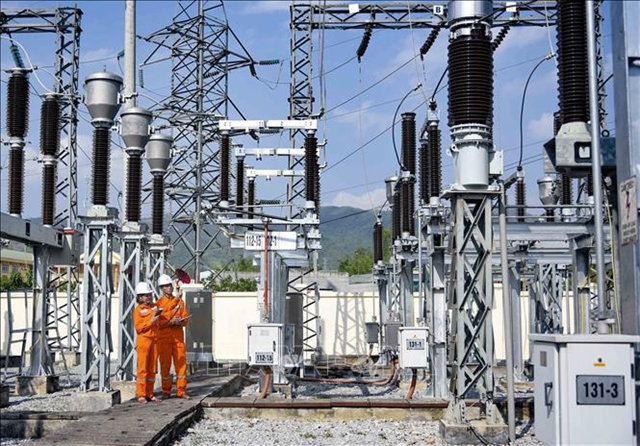
On November 30, 2024, the National Assembly adopted the new Electricity Law with effect on February 1, 2025 comprising 130 articles, seeking to ensure energy security and achieving net zero emissions by 2050 by overcoming investment barriers in the energy sector. Việt Nam News reporter Thu Ngân asked Nguyễn Mai Phương, Counsel of Asia Counsel Vietnam Law Company Limited, about the significant changes to the law and how they will impact foreign investments in the sector.
What are the main changes to the Electricity Law and the importance of these changes for the National Power Development Plan VIII (PDP VIII)?
The law continues to regulate the rights and responsibilities of various parties involved in and oversee electricity-related activities. It addresses critical issues like the licensing of electricity operations, the functioning of a competitive electricity market and associated business activities within the energy sector.
The amendments are a significant aspect of the Government’s strategic efforts to achieve net zero emissions by 2050.
One of the key changes is a new chapter dedicated to the development of renewable energy and new energy projects. This addition reflects the Government’s strong commitment to fulfilling its net zero targets through a framework that promotes sustainable energy initiatives via various mechanisms and incentives, solidifying Việt Nam’s position in global energy transition.
Which amendments do you think will have a strong impact on foreign investors and projects in Việt Nam and how do you see the opportunities in renewable energy for foreign investors after the changes take effect?
From the standpoint of foreign investors, two critical changes relate to the regulations governing the development of renewable energy projects and the procedures for selecting investors in power plants.
The law articulates fundamental principles that investors must adhere to while pursuing renewable energy projects. Prior to the enactment of this legislation, there was considerable uncertainty surrounding whether investors in non-public-private partnership (non-PPP) renewable energy projects would be selected based on competitive bidding processes and which State agencies approve investment policies for offshore wind projects.
The new law clarifies these areas by specifying that the selection of investors for power generation projects will primarily follow land auction procedures as outlined in the Land Law or bidding procedures defined in the Bidding Law, with certain exceptions made for urgent situations and State-invested projects.
However, while the new regulatory framework for offshore wind projects is a step forward, it may not be sufficiently appealing to foreign investors.
For example, developers are now required to navigate a meticulous two-step selection process for wind surveys and project implementation phases.
Furthermore, the conditions, restrictions, and incentives related to investments in offshore wind projects remain unclear, pending additional governmental guidance at the by-law level.
This lack of clarity may present challenges for foreign investors seeking to establish a foothold in this emerging sector.

Critics say the amendments provide an ‘escape route’ for renewable power projects. What is your opinion on this?
In addition to establishing a fresh chapter centred on renewable energy development, the law also acknowledges several recent mechanisms pertinent to renewable energy projects, most notably direct power purchase agreements (DPPA) and self-production and self-consumption frameworks for rooftop solar power systems (RTS). These mechanisms have been detailed in two recently enacted decrees, signalling a robust pathway for renewable energy project development.
The new law indeed provides a viable avenue for renewable power projects, particularly those utility-scale projects that do not qualify for Feed-in Tariffs under the standard 20-year power purchase agreements with Vietnam Electricity. It is crucial for developers and consumers involved in these renewable energy initiatives to comply with specific conditions and follow prescribed procedures to successfully implement either the DPPA or RTS self-consumption models.
With the establishment of the DPPA and RTS self-consumption mechanisms, coupled with clearly outlined investor selection requirement under the new Electricity Law, there is substantial potential for an effective “escape route” for both existing and forthcoming renewable energy projects. This development creates a conducive environment for innovation and investment within the sector.
What would you tell foreign investors to ensure they are fully prepared before the law comes into effect as well as to grab opportunities for investing in renewable energy?
As it pertains to greenfield projects where investor selection is determined through competitive bidding, the Government recently released two pivotal pieces of legislation: Decree No 115/2024/ND-CP and Circular No 27/2024/TT-BCT.
They provide a comprehensive outline of the bidding processes and criteria for selecting investors in energy projects.
With the new Electricity Law taking effect on February 1, 2025, these guidelines become mandatory for all power generation projects.
Prospective investors interested in greenfield projects should familiarise themselves with these key regulations to ensure they are well-prepared for forthcoming bidding opportunities. Compliance with these established procedures will be essential for navigating the competitive landscape effectively.
While the recent changes introduced by the new Electricity Law aim to encourage innovation and investment in renewable energy, the existing framework for brownfield project acquisitions will likely remain relatively stable in the short term.
Investors and stakeholders in the renewable energy market can expect the legal guidelines governing M&A activities for these projects to largely follow the established principles in the Law on Investment and implementing legislation, which allows for the purchase and sale of assets and stakes in operational projects.
However, the uncertainty surrounding potential future regulations poses a noteworthy challenge for investors. It remains unclear if the Government will take steps to introduce additional implementing regulations at the decree level aimed specifically at refining or expanding the M&A processes in the renewable energy sector after the Electricity Law amendments come into effect. For example, will there be any restriction on transfer of ownership in the construction phase of any renewable energy project?
Observers in the market are closely monitoring developments in this regard, as these regulations could have significant implications for both domestic and foreign investors seeking to engage in the acquisition of existing renewable energy assets. As such, industry participants are urged to remain vigilant and informed about the evolving legal landscape.
The introduction of new guidelines or clarifications could open up new avenues for investment or impose new requirements that would need to be navigated carefully. Investors can benefit by consulting legal and industry experts to better understand how these potential changes could impact their strategies and operations.
(VNS)




